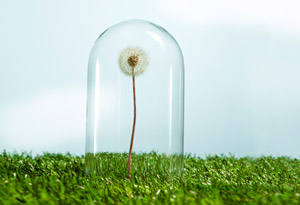Being Sensitive to the Sensitive
Why isn’t the condition of the Highly Sensitive Person (HSP) more publicized?
Nowadays, we’re thankfully more aware of people with different ailments and conditions that once went unrecognized and were quickly dismissed. Kids who couldn’t concentrate in school were considered to be disruptive troublemakers; now we know that Attention Deficit Disorder (ADD) and Attention Deficit Hyperactivity Disorder (ADHD) are real conditions. Older people who were extremely forgetful just couldn’t remember things because of their advanced age; today we understand that Alzheimer’s Disease is not a normal part of aging. There’s another condition, though, that’s still largely unknown in the mainstream–the Highly Sensitive Person (HSP).
Despite what it may sound like at first, the HSP is not a person who’s simply oversensitive or, to put it in plain terms, a wimp or a wuss. An HSP is someone whose nervous system, through genetics, is overwhelmed by stimuli in the world around him or her. It’s common for an HSP to be easily startled, uncomfortable in large groups of people, overcome by loud noises and bright lights, and dread conflict. When an HSP encounters such circumstances, he or she usually needs some downtime alone to decompress, to rest, and to calm down. Meditation, yoga, and going outdoors in nature helps the HSP deal with the world and its different stressors.
How do I know so much about HSPs? Because I am one. Even though I know my husband is in the house, I will jump a mile if I’m not expecting him to be right behind me at a given moment. I detest crowds and avoid shopping malls like the plague around Christmastime. Although I’m not a hermit and enjoy socializing, the activity drains me, and afterward I need some quiet time with a book or a knitting project. When I do watch TV, it’s with dim lighting in the room, and I hate, absolutely HATE and avoid confrontations at all costs. These aspects of my character may make me appear fussy and weak, but that’s only an illusion.
As an HSP, I’m very tuned in to the emotions and needs of others. I have a higher than average level of caring and understanding. I’m more of a peacemaker than a warmonger; I try be diplomatic and keep people pleased and in good spirits, even if it’s sometimes at a cost to myself. On a more personal level, I have a very deep and rich inner life that is very spiritual (by spiritual, I don’t mean religious, but a connection between myself and humanity, myself and nature). And before you think that we HSPs are small in number, know that roughly 20% of the world’s population are HSPs (that’s 1 out of every 5 people) and include many famous personalities including Emily Dickinson, Albert Einstein, Abraham Lincoln, and Mother Teresa, among others. So what I’m wondering is why can’t the non-HSPs out there recognize HSPs and appreciate their strengths?
Why, indeed.


I appreciate the strengths of the HSP; compassion, understanding, peacemaking, etc. As for myself, I am somewhat too sensitive at times (or so I’m told),although probably not a full strength HSP. I do care what others think and try to make sure everyone is happy. I don’t love the crowds, but I love interacting with people one on one and getting to know them. I love to shop, but it’s the hunt I love, not the crowds. I also hate confrontation. I think it’s interesting that we are all made differently to compliment one another. If we were all the same, it would be a pretty boring world. We need to be sensitive to another person’s needs, and therefore it takes the focus off ourselves and makes us help others; just the way it should be.
Thank you for your nicely worded reply! It’s sad that society sees sensitivity as a negative trait, so thank you for having the courage to share that you’re also a sensitive person. I’m probably biased, but I think there’s nothing wrong with being sensitive, and the world could probably use a little more sensitivity, compassion, and understanding. And I completely agree with you–we need to be sensitive to the needs of others. Period. Wouldn’t that make our relationships and interactions with others so much better?